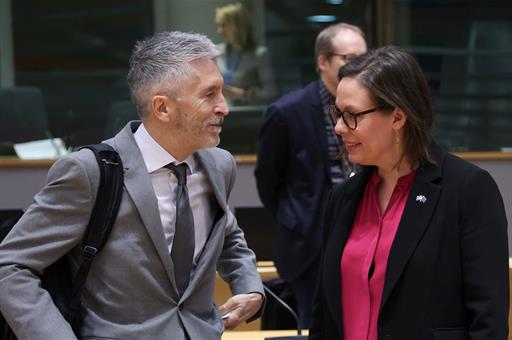Grande-Marlaska in Brussels presses for the elimination of border checks "that are harming citizens"
News - 2023.3.9
Grande-Marlaska reiterated that freedom of movement "is compatible with security," expressing his regret "that controls, which should be an exceptional resource, are undermining the area of free movement and the essence of the border-free travel area".
Regarding migration, the minister stressed the need for "greater involvement" of European states and institutions in cooperation with the countries of origin and transit of migratory flows, pointing to the solidarity mechanism "as the most appropriate framework" for achieving this progress.
During his speech to the Council of EU ministers for home affairs, he recalled the recent tragedy off the coast of Crotone to highlight the challenges of the migratory phenomenon in the Mediterranean and the Atlantic. "This human tragedy, and so many others that we have not been able to avoid, underlines once again the importance of the external dimension, as I have also conveyed to Europol and Frontex in recent visits to the two agencies".
In this regard, Grande-Marlaska stressed the importance of cooperation between European security agencies in the fight against human smuggling and trafficking. "Achieving synergy between Frontex, Europol and Eurojust is a key operational measure", he said.
The minister attributed the decrease in irregular arrivals to Spain "to the preventive efforts" of Spanish migration policy, which this year has achieved a reduction of 56.9%, consolidating the downward trend experienced in 2022, which closed with a decrease of 25.6%.
"There is a need to strengthen cooperation with our southern neighbourhood partners, with has a clear added value that complements bilateral cooperation," he added, qualifying the status agreements with Mauritania and Senegal as "particularly relevant".
Migration and Asylum Pact, a Spanish priority
With an eye on the Spanish Presidency of the Council, the minister said that the conclusion of the Pact on Migration and Asylum "on the basis of solidarity and the equitable sharing of responsibility is essential and an absolute priority for Spain", as discussed with his counterparts from Italy, Cyprus, Greece and Malta, all members of the MED5, at the recent MED5 Summit held on 4 March in Valletta (Malta).
The minister, who will take part this Friday in the ministerial meeting on the EU Internal Security Support Hub in Moldova, expressed his support for this cooperation mechanism. "The situation in both Ukraine and Moldova is not a problem for these nations to face alone, but for the whole of Europe to join efforts and capabilities in support of these countries, partners and friends", he underlined in his speech.
The Council of Ministers for Home Affairs also set the priorities for the EU's EMPACT platform until 2025 in the fight against organised crime, which will range from cyber-attacks and trafficking and exploitation of human beings to economic and financial crime and environmental crime. The European Forensic Science Area Action Plan has also been adopted, which until 2030 will strengthen capacities in this field in support of judicial proceedings.
Preparatory meetings for the Spanish Presidency
Grande-Marlaska took advantage of his visit to Brussels to hold meetings in preparation for Spain's presidency of the European Union. This morning he met with the chairman of the European Parliament's Committee on Civil Liberties, Justice and Home Affairs (LIBE), Juan Fernando López Aguilar.
This Friday he will hold a series of bilateral meetings with the Commissioner for Home Affairs, Ylva Johansson, the Belgian Minister for Home Affairs, Annelies Verlinden, and the Secretary of State for Asylum and Migration Policy, Nicole de Moor.
On Friday, he will also take part in the European Day of Remembrance for the Victims of Terrorism, organised by the European Commission in Brussels.
Non official translation





